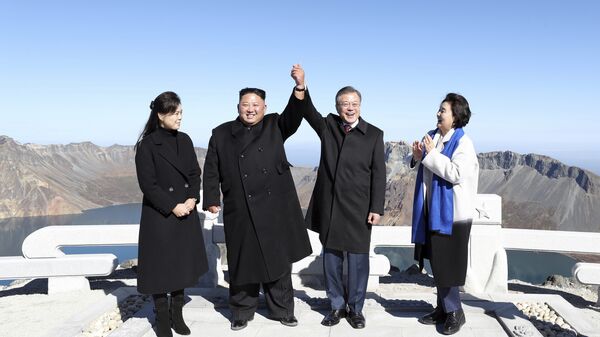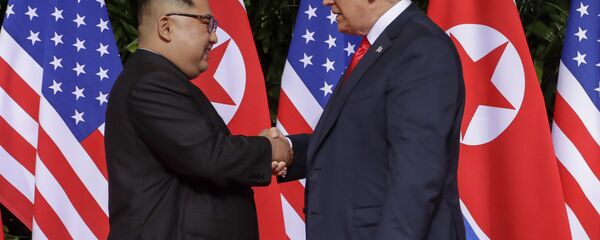South Korea's Defense White Paper is a document that is adopted on a biannual basis and takes stock of the given period, defining the development areas for the next 2-year period.
Who Is Your Enemy?
One of the most important innovations of the new White Paper was the definition of an enemy. Before the document's release, South Korean media suggested that the administration of South Korea's liberal President Moon Jae-in in its first Defense White Paper would refrain from the use of poignant expressions targeting Pyongyang, which were favoured by previous conservative administrations, directly calling Pyongyang Seoul’s "enemy."
READ MORE: Trump Sends Letter to North Korean Leader Amid Preparations for Summit — Reports
Such assumptions proved to be accurate, with the document stating that "forces that threaten sovereignty, territory, people and assets of the Republic of Korea and violate them" are considered the enemies of the South Korean armed forces.
The South Korean Defense Ministry explained in a press release devoted to the publication of the White Book that "the expression ‘enemy’ in terms of national defence goals refers not only to North Korea's threat, but also to hidden and growing supranational and non-military threats."
Despite the fact that the document took note of favourable changes in Pyongyang’s policy toward Seoul and bilateral agreements to build trust in the military field reached by the two states, it said that Seoul was still ready to retaliate against Pyongyang's possible provocations and monitored the North's activities. In particular, the paper indicated that the South Korean military would continue to monitor the situation in the Northern Limit Line in the Yellow Sea, where the parties agreed to stop hostile activities.
READ MORE: Pyongyang Urges to Stop Foreign Military Exercises on Korean Peninsula — Envoy
The Defense Ministry also made an assessment of Pyongyang's stocks of nuclear materials. According to the document, North Korea possesses 50 kilograms (110 pounds) of plutonium and considerable quantities of highly enriched uranium.
Regional Trend
The document also touched upon the military policies of the countries of the region and world's key players. The Defense Ministry, in particular, drew attention to such things as the confrontation between the United States and China, the strengthening of the Japan Self-Defense Forces and changes in the structure of the Chinese armed forces.
The document once again underlined South Korea's determination to strengthen the country's combat readiness in the area of the Dokdo islands (referred to as Takeshima by Tokyo), whose sovereignty is contested by Japan.
The document recalled that in 2018, Seoul decided not to take part in the most large-scale joint military exercises with the United States, but did not specify whether they would be resumed in the future.
The 14 kinds of North Korea's ballistic missiles (some under development).
— Youkyung Lee (李柳暻) (@YKreports) January 15, 2019
Source: South Korea's Defense White Paper, 2018 edition (in Korean) https://t.co/u8VNcF4lvD pic.twitter.com/xLerp5UWr1
Future Challenges
The documents also highlighted the need to increase the competitiveness of the national defense industry and enhance the transparency of military structures for the country's population, including within the framework of the national Defense Reform 2.0 project, which was launched in light of a scandal of the military structures' interference in political life under the administration of former South Korean President Park Geun-hye (2013-2017).
In addition, the paper stated that the country’s defence budget would be increasing in the coming years. A defence plan released earlier in January projected defence spending at the level of $243 billion in the next five years, with the annual growth of defence budget totalling 7.5 percent.





